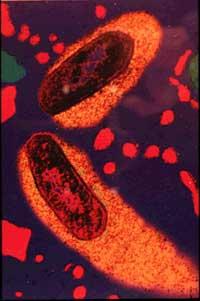Listeria sensitivity key
Listeria monocytogenes can cause a serious illness contaminated with food. The main characteristic of listeriosis is the general blood infection, which sometimes causes inflammation and brain abortion.

Thanks to its internaline protein in the skin, bacteria bind to the protein E-kaderine of the host cell surface. In this way they penetrate the intestine into the host body. However, although mice also contain receptor protein, they have no sensitivity to the bacteria taken by the mouth.
Now, Pascale Cossar and his team at the Institut Pasteur de France have managed to change an amino acid from mouse protein to a transgenic mouse that is infected by the mouth of Listeria. Comparing E-kaderin protein from sensitive animals and not bacteria, researchers found that mice contain glutamic acid instead of human amino acid 16 proline. So they thought that was the key and applied to the mice the sequence of the human protein E-kaderine.
Thanks to these genetically modified mice a new line of research has been opened. Until then, researchers infected mice by introducing the bacteria directly into the blood or into the peritoneum. In addition, although transgenic mice have been previously used to study viral infections, it is the first time they have been transformed to investigate bacterial infections.
Cassar believes that a model can be made to study infections caused by other bacteria. In addition, internaline protein internalization capacity can be used to transport drugs or genes. If it is important to bring the desired drug or DNA to the exact cell, it is more important to take it to the right place in the cell.
However, so far they are only the first results and in the future we will have to do more research, to see if those beliefs are carried out.
Buletina
Bidali zure helbide elektronikoa eta jaso asteroko buletina zure sarrera-ontzian











